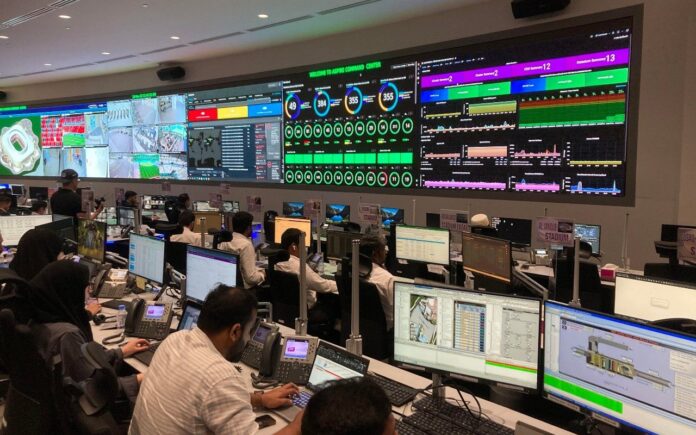Fans will be monitored by 20,000 cameras and artificial intelligence that can determine whether a supporter is angry from facial expressions
Travelling fans of England or Wales who misbehave at the World Cup finals in Qatar will not be able to escape the all-seeing eye of 20,000 cameras in the eight stadiums alone, making this tournament the most heavily surveilled of its kind.Fans will be monitored from the moment they enter the stadium area to their departure and all over the tiny Gulf state, local organisers have said. A sophisticated central surveillance and control hub has been developed in time for the tournament that will convey instructions to security staff on the ground with the aim of stopping any trouble as soon as it begins.Local organisers say that their artificial intelligence [AI] programmes are so advanced that they can tell whether a spectator is angry from analysing facial expressions. The cameras are sufficiently powerful that they can zoom in and identify each spectator in every single stadium seat.Telegraph Sport was given a tour of the Aspire Command and Control Centre near to the Khalifa International stadium where England play their first World Cup game against Iran, a week on Monday. While the centre is not responsible for the policing of the event, it will be the hub for all intelligence gathering at the eight stadiums and will relay constant orders and advice to security forces.Qatari organisers are adamant that there will be no repeat of the stadium invasions that took place before the Euro 2020 final at Wembley in July last year. Nor, they say, will there be the shambolic crowd management that made the Champions League final in Paris in May such an unpleasant experience for many Liverpool and Real Madrid fans.The centralised system was built with the World Cup finals in mind and controls all eight stadiums remotely. From their screens, operatives can moderate the temperature in the stadium, lock and unlock doors, check crowd flow and tell right down to the last person how many people are in an area of the stadium at any one time.Security surveillance cameras are a fundamental part of life in Qatar with any planning permission for new buildings granted by local authorities dependent on cameras being in-built. The organising committee’s chief technology officer Niyas Abdulrahiman said that the policy was to store all footage taken by the 20,000 stadium cameras for no more than 120 days after its creation.The Qatari authorities see no issue with privacy and believe that intense surveillance, along with the data that it delivers about crowd movement and potential bottlenecks, will enable them to spot potential problems before they develop. “The safety and security of our fans is of the utmost importance,” Abdulrahiman said. “We want to make sure that we have a safe event.”
The cameras that can pick out a face in the crowd from the opposite side of the stadium were so sophisticated that, Abdulrahiman said, they could find a lost child in a sea of people through facial recognition technology. The AI is also capable of picking out someone who is smoking. All eight stadiums are smoke free. They are all currently locked down to all but accredited Fifa and local organising personnel.Abdulrahiman did concede that some AI programmes struggled to distinguish between the expressions of supporters simply angry at their team’s performance and those who might be on the brink of violence. Face paint can also affect that calculation.Nevertheless, the Qatari organisers do not anticipate violence on any major scale. The most serious prohibited behaviour they most often have to deal with is excited fans standing on seats. “We inform ground forces and they can request them to sit in their seats,” Abdulrahiman said. “The purpose is that we have a safe game, that the fans enjoy it and they go home with sweet memories of the Qatar World Cup.”The centre has already taken charge of 75 events including the Fifa Arab Cup earlier this year and, after the World Cup, the AFC Asian Football Cup comes next year. Asked directly to guarantee there would be no repetition of the chaos that engulfed the Euro 2020 final at Wembley and then the Stade de France in May, Abdulrahiman said “we have the tools and technology to protect people”. He added: “We are well prepared for this scenario and to a great extent we will be able to avoid it [before it happens].”
The strategy behind the technology is to anticipate problems. Even a single fan trying to swipe a ticket at the wrong gate will set off an alarm in the command centre and ground forces will be told immediately to guide the person away to prevent congestion forming.The command centre’s AI can count fans in a certain area of a stadium and calculate if there are too many for the planned capacity. It can also use facial recognition technology to review the thousands of hours of footage in its archive. Abdulrahiman, and the centre’s director Hamad Ahmed al-Mohannadi, said that the intense surveillance was not undertaken with a view to prosecutions or data gathering but with the emphasis on security.Nevertheless, supporters can expect their movements to be monitored in detail at World Cup venues in Qatar and all over the peninsula. Abdulrahiman acknowledged that the tournament could well be a target for a cyber attack. “We are all under that risk and the World Cup is no different. What we can do is be prepared for it. You have to build your defence, get the right tools and the right skillset in people.”It’s a highly visible event and people with bad intentions can try to take advantage of this operation. We have close monitoring with the NCSA [Qatar’s National Cyber Governance and Assurance Affairs] and we work with global partners to assess the global threat.”
We rely on advertising to help fund our award-winning journalism.


